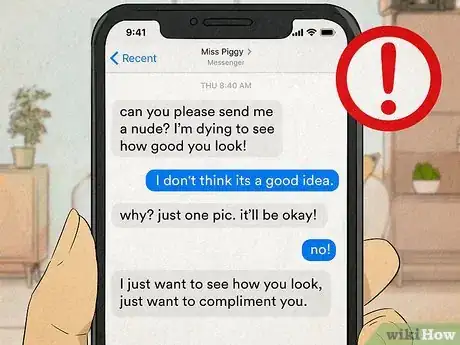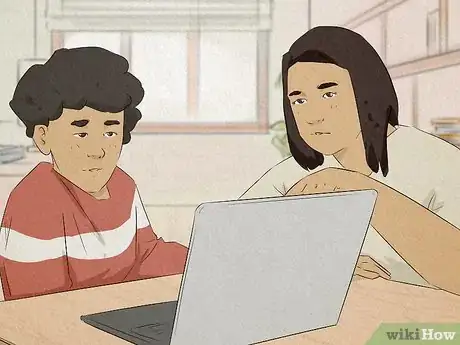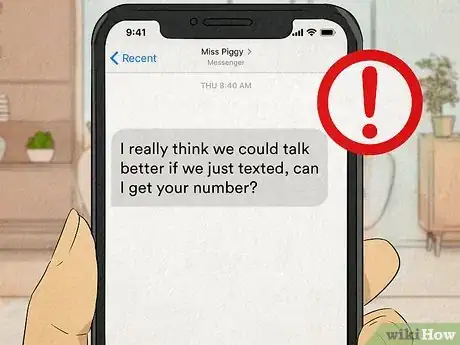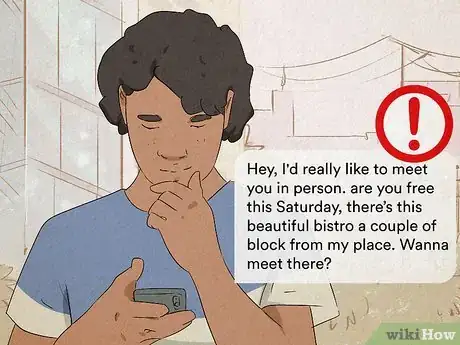This article was co-authored by Luigi Oppido and by wikiHow staff writer, Hannah Madden. Luigi Oppido is the Owner and Operator of Pleasure Point Computers in Santa Cruz, California. Luigi has over 25 years of experience in general computer repair, data recovery, virus removal, and upgrades. He is also the host of the Computer Man Show! broadcasted on KSQD covering central California for over two years.
There are 8 references cited in this article, which can be found at the bottom of the page.
This article has been viewed 15,709 times.
In today’s digital world, it’s easy to meet both friends and potential romantic partners online. However, meeting people over the internet comes with some dangers, so using caution while you chat is extremely important. Read through some of the most common situations you might find yourself in online and what you can do to keep yourself safe.
Steps
Scammers may try to trick you out of your money.
-
If anyone ever asks you to loan them some cash, always decline. They might use guilt (“but we’ve known each other online for so long!”) or even pity (“I have no money to feed my family”), but you’ll never know if what they’re saying is true. You should never give out any personal info online, and you should only send money to the people you know, not ones you’ve met over the internet.[1] X Research source
- Some people will spend weeks (or even months) getting to know you over the internet before they ask for money. Just because you think you know someone online doesn’t necessarily mean you know who they are in real life, so always be cautious.
Blackmailers might try to get explicit images of you.
-
People may try to use your online activity against you. If an account asks you to send explicit messages or photos to them, be very cautious, and never send anything you wouldn’t want your friends and family members to see. Accounts will sometimes make you pay money to them so they don’t send the pictures and videos to your close contacts.[2] X Research source
- People might also try to use your explicit photos to get you to send them more images. If you’re being extorted, tell a trusted adult right away, or report it to the police.
Liars may misrepresent themselves online.
-
Unfortunately, some people lie to make themselves look better on the internet. If you’re online dating, you can’t quite trust everything someone’s profile says—maybe they exaggerated about how good their job is, or perhaps they’re using pictures of themselves from 10 years ago. You can avoid liars by doing a little sleuthing on your own: try googling their name or finding their social media profiles to see if what they’re presenting is really true.[3] X Research source
- More insidious people will lie to get personal information about you online. That’s why you should never give out your full name, address, or any financial info to someone you don’t know.
Catfishers might pretend to be other people.
-
You could be talking to someone completely different than you think. These people, called catfishers, will create online profiles and befriend you while using fake pictures and information. They might do this because they have low self-esteem, or they might do it just to trick people online. You should always try to do a little background checking on the person you’re talking to, just to make sure they’re a real person.[4] X Research source
- If you ask to talk to them over the phone or on video chat and they refuse, that’s a red flag. It could be a sign that their pictures and who they are don’t match up.
Thieves may try to steal your identity.
-
Your personal information can be used to get your money. These people might ask for your address, your full name, or even your social security number. They might also try to get you to tell them your personal passwords or your bank account information. Never give this info out online, and always block anyone who is trying way too hard to glean this info from you.[5] X Research source
- Sometimes, thieves will get your bank account information by saying they want to send you money. Instead, they’ll use your info to wire themselves a large amount and then block you online.
People may send you phishing or malware scams.
-
Clicking random links can download harmful software onto your computer. If you get a message or an email from someone online that has a link in it, don’t click it on your personal computer. If they want you to go to a website, search for it yourself to avoid accidentally getting hacked. Malware can destroy a computer, and it can cost you your personal information if you aren’t careful.[6] X Trustworthy Source United States Department of Justice Official website of the U.S. Department of Justice Go to source
- Even websites that seem legitimate can be set up by scammers to get your personal information. Never enter any of your info into a site unless you’re sure that it’s trustworthy.
Friends or partners might ghost you.
-
Some people find it easier to ghost people they’ve only known online. If you’ve been talking to someone for a while and you all of the sudden can’t get ahold of them, that’s called being ghosted. You might reach out for multiple days (through multiple avenues), and still get no answer. This can be really disheartening, and it can be tough to move on from relationships where you get ghosted.[7] X Research source
- People ghost others for a lot of reasons: maybe they wanted to break off your relationship and they didn’t want to upset you, maybe they had to delete their accounts, or maybe they were lying about who they really were. Getting over being ghosted can be hard, but the best thing you can do is move on.
Bullies could target you online.
-
People online often feel more anonymous than in real life. When you meet someone online, they might start out super nice, but they could quickly turn nasty and mean. These bullies are just using their online presence to harass and antagonize people, and the best thing you can do is block them so they can’t message you again.[8] X Research source
- If you’re being bullied online by multiple people, talk to a trusted adult. They can help you take the next steps to end the harassment.
Sexual predators may approach you online.
-
It’s easy for predators to make fake accounts. Unfortunately, sometimes people who like to prey on children will make profiles pretending to be young, too. Then, they’ll talk to kids and pretend to be their own age to get close to them. It’s important to never give out any private information online, even if you think you know someone. Profiles can be fake, so you can never be 100% sure who you’re talking to.[9] X Research source [10] X Expert Source

Computer & Tech Specialist Expert Interview. 31 July 2019.- If you have kids, be sure to warn them about the dangers of sexual predators online.
Stalkers might access your personal information.
-
Your personal information can be used to find out where you live. Unfortunately, some people will look at your photos and the info you’ve put online to figure out where you spend most of your time. You can keep this from happening by making sure your social media accounts are private and never posting any personal information about where you live.[11] X Trustworthy Source United States Department of Justice Official website of the U.S. Department of Justice Go to source
- People who are tech savvy can even take a look at the geotag on your photos and figure out your exact location. It’s important to only share things with people you know in real life, not ones you’ve only met online.
Dangerous people might ask you to meet up.
-
They may be inviting you out for nefarious purposes. If you’re diving into the online dating world, be very careful about who you choose to meet up with in real life. Unfortunately, sexual assault can be common on dates, especially with people you don’t know well (or at all).[12] X Trustworthy Source Rape, Abuse, and Incest National Network Largest anti-sexual assault organization in the US providing support and advocacy for survivors Go to source
- Stay safe while online dating by checking out the person’s social media profiles, video chatting with them before you meet in person, and telling a friend where you’re going and who you’re with.
You Might Also Like


 How to Find Out if Someone on Discord Blocked You
How to Find Out if Someone on Discord Blocked You
 How To Leave a Private Story on Snapchat
How To Leave a Private Story on Snapchat
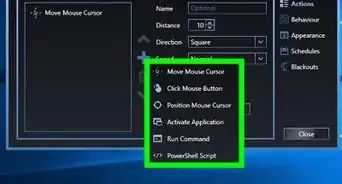 4 Quick and Easy Ways to Keep Microsoft Teams Active
4 Quick and Easy Ways to Keep Microsoft Teams Active
 What Does WSP Mean?
What Does WSP Mean?
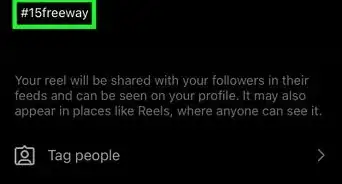 How to Copy Hashtags on Instagram
How to Copy Hashtags on Instagram

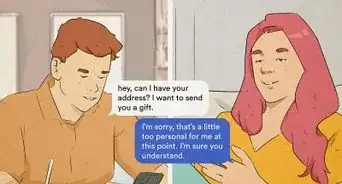
 How to Share a Zoom Meeting Link (2020)
How to Share a Zoom Meeting Link (2020)


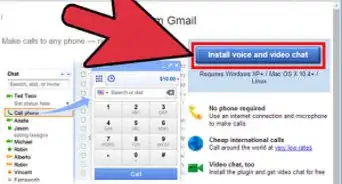

References
- ↑ https://www.psychologytoday.com/us/blog/the-mating-game/201609/the-ugly-truth-about-online-dating
- ↑ https://www.fbi.gov/news/stories/stop-sextortion-youth-face-risk-online-090319
- ↑ https://www.psychologytoday.com/us/blog/the-mating-game/201609/the-ugly-truth-about-online-dating
- ↑ https://www.aarp.org/money/scams-fraud/info-2021/david-mcclellan-online-dating.html
- ↑ https://kidshealth.org/en/kids/online-id.html
- ↑ https://www.justice.gov/usao-ndga/protecting-yourself-while-using-internet
- ↑ https://www.psychologytoday.com/us/blog/the-couch/201705/6-ways-deal-the-pain-being-ghosted
- ↑ https://kidshealth.org/en/kids/online-id.html
- ↑ https://kidshealth.org/en/kids/online-id.html
- ↑ Luigi Oppido. Computer & Tech Specialist. Expert Interview. 31 July 2019.
- ↑ https://www.justice.gov/usao-ndga/protecting-yourself-while-using-internet
- ↑ https://www.rainn.org/articles/online-dating-and-dating-app-safety-tips
About This Article


